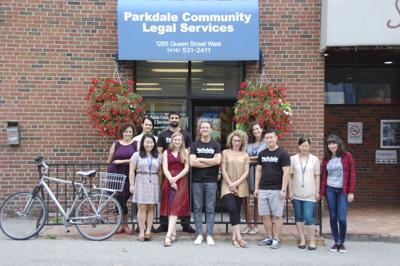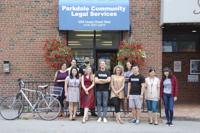Parkdale Community Legal Service (PCLS) student workers have made history by being the first student union in the clinic’s 44-year history.
“There has been organizing drives periodically throughout the history of the clinic to become a union, but with no success,” said Jenna Meguid, one of the lead organizers of the unionizing effort for the students.
The past attempts haven’t been successful until now. Meguid said what helped with this group’s success was seeking advice from those who tried to unionize in the past.
“They gave us well-timed advice to start early,” she said.
Students who work for PCLS on a four-month summer contract position are currently enrolled in the Osgoode School of Law with the York University. Students do similar jobs to full-time staff at PCLS, such as advise and represent community members in their disputes with employers, landlords and government agencies, perform frontline intake, legal research and writing, administrative work, community organizing and public legal education.
Students can focus on one of five areas of law when working for PCLS: workers rights, social assistance, violence and health, landlord and tenant and immigration.
Full-time staff members at PCLS have their own union, but students were never members. To rectify the situation students sought out the help of the Ontario Public Service Employees Union (OPSEU) organizing representative Kiera Chion.
Chion told The Villager the main reason for the students’ push to become a union was due to intense workloads.
“Oftentimes students were being paid for 35 hours, but worked up to 60 to 70 hours,” the OPSEU rep said.
“A lot of issues were also around the lack of input in workplace decisions regarding workload, equity and transparency around how decisions are made that impacted their work directly.”
The workload was having an impact on how student caseworkers split their time as well, Meguid told The Villager.
“There’s a lot of case work coming through the door, so it can be hard to find the time to do community legal work,” Meguid said. “How can we carve out time to make sure that we have time for the important work that needs to be done and be in service of the community (in a way that) allows you to have in impact.”
Eighty per cent of the student workers, 16 out of 20, agreed to move forward with the unionization. From there, students signed membership cards and an application was sent out to the Ontario Labour Relations Board by OPSEU on their behalf.
PCLS then had a few days to respond to their request and the answer the students got was “hurtful and surprising,” Meguid said.
The Villager contacted the board at PCLS to discuss its response, but did not get a reply by press deadline Tuesday.
“Their legal response was that they don’t see us as employees at all,” Meguid said. “It was one we didn’t expect at all and was one that for us threw in our face the values we’re trying to embed in the workplace.”
PCLS said they believed they did not have a sufficient connection to the workplace to constitute an appropriate bargaining unit, Chion said.
The response, she said, was ideologically driven and isn’t grounded in reality because the students receive a pay cheque and get T4 forms.
However, the students sought out the help of members of PCLS and alum to sign a letter to the board showing the overwhelming support the students had from workers both past and present and the community; they had 237 signatures to give to the board. It is now supportive of the union.
The next steps for the union, Meguid said, are nailing down their demands of the employer, students also have two options. They can start a new separate union from scratch or join the existing union and hammer out a few issues, specific to being a caseworker there for a short period of time.
“It’s a really exciting development,” Meguid said.



 Report an error
Report an error Journalistic Standards
Journalistic Standards








